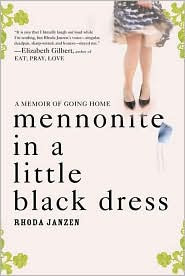Happiness is a Warm Gun

This mystical positivity seeped into the American megachurches, as celebrity pastors became motivational speakers in robes. In one of the great untold stories of American religion, the proto-Calvinist Christian right — with its emphasis on sin and self-discipline — has lately been replaced by a stitched-together faith known as “prosperity gospel,” which holds that God wants believers to be rich.
I would just add: not just "lately"; this of course is a staple theme of much popular Protestantism from way back in American history.
Second, seemingly very different but addressing many of the same issues: a review of Rhoda Janzen, Mennonite in a Little Black Dress: A Memoir of Going Home. After being ditched by her husband who fell into a gay online romance, and suffering an automobile accident, Janzen returned to her Mennonite community roots, and this wry memoir tells of the virtues of stoicism and toughness (and some really bad food) that came from her upbringing and her no-nonsense mom.
It’s the narrative voice of the person who grew up in an ethnic religious community, escaped it, then looked back with clearsighted objectivity and appreciation.
Also reviewed here by a Professor English at Goshen College (a Mennonite college in Indiana). An excerpt from the book is here.

Comments